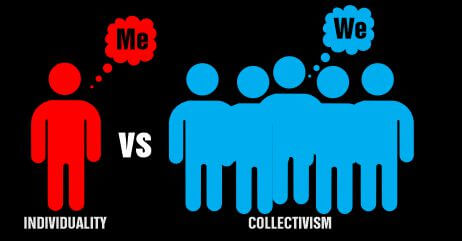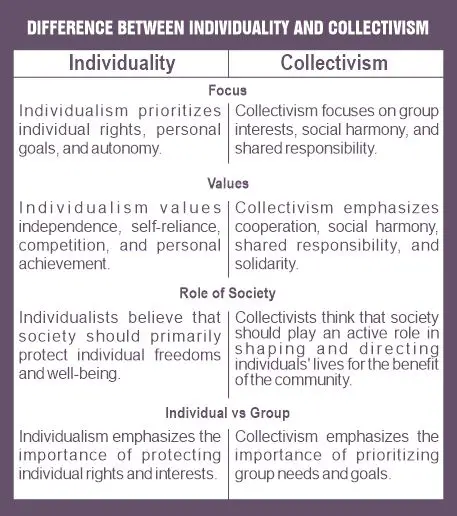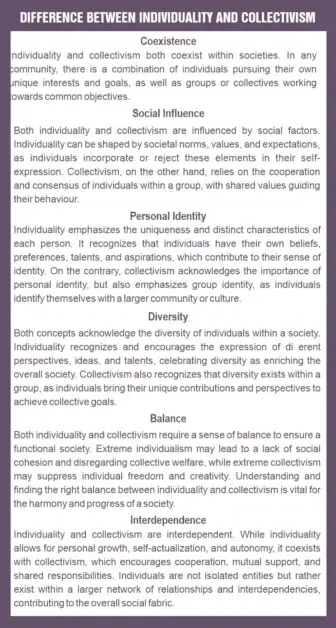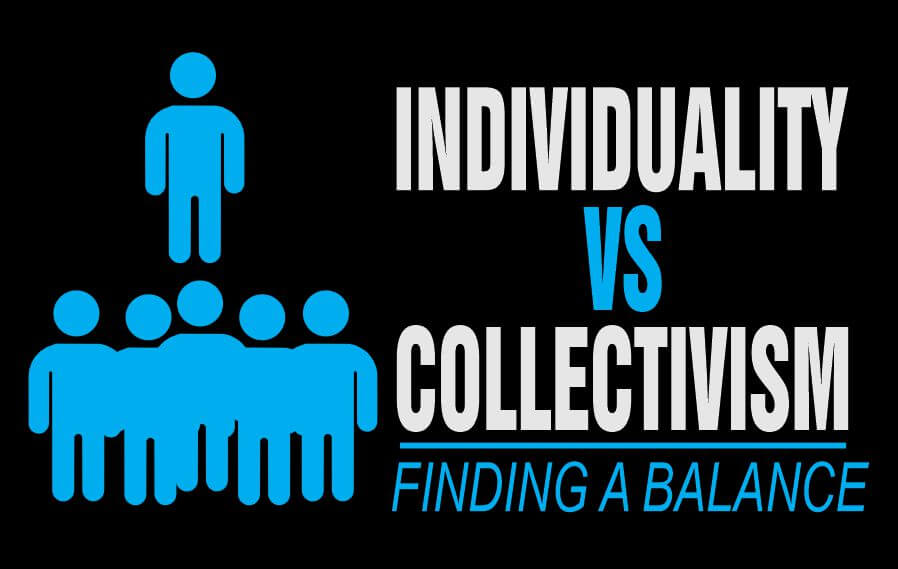Individuality vs collectivism is a debate of two contrasting ideologies that address the relationship between the individual and society.
They represent different ways of thinking about social organization, values, and goals.
Individuality emphasizes the uniqueness, autonomy, and independence of individuals.
It recognizes the value of personal freedom, self-expression, and the pursuit of individual goals and desires.
In societies that prioritize individuality, there is an emphasis on personal rights, individual achievements, and the protection of individual liberties.
Individuality celebrates diversity, encourages personal growth, and values the contributions of each unique individual to society.
On the other hand, collectivism has to do with the importance of collective groups or individual interests.
It places a greater emphasis on shared goals, cooperation, and the well-being of the group as a whole.
In collectivist societies, there is a strong sense of community, social cohesion, and interdependence.
It is important to note that individuality and collectivism exist on a spectrum, and people and society can exhibit varying degrees of emphasis on each.
Some cultures and societies lean more towards individuality, while others lean more towards collectivism.
Individuality in a Collectivist Society

As a human, you yearn for a sense of belonging, acceptance, and security within your community.
However, in collectivist societies where conformity and societal roles hold prominence, it is crucial to remember the importance of harnessing and celebrating your individuality.
Embracing your unique qualities not only helps you grow as an individual but also enriches society as a whole.
It is important you preserve and nurture your individuality while coexisting in a collectivist society, offering a fresh perspective on self-discovery, personal development, and breaking free from the constraints of conformity.
Suggested: How to Identify a Collectivist Culture
The Paradox of Collectivism and Individuality
Attempting to strike a balance between individuality and collectivism can often appear daunting.
Collectivist societies prioritize the well-being of the group over individual desires and needs.
Although this emphasis on harmony and cooperation can be commendable, it is essential to recognize that true progress and holistic development arise from the unique contributions of individuals.
By acknowledging and celebrating individuality, a collective society can harness the power of diversity, encouraging innovation, cultural richness, and collective growth.
Related: How to Overcome Individuality Complex
The Power of Uniqueness
Each person possesses inherent talents, perspectives, and experiences that cannot be replicated.
Your individuality is a gift that contributes to the diversity of the collective whole.
By embracing your uniqueness, you add depth and authenticity to your community, inspiring others to express their individuality fearlessly.
Remember that by staying true to your genuine self, you liberate those around you by giving them the courage to celebrate their own distinctiveness.
Related: The Individualistic Society and How it Affects You
Difference between Individualism and Collectivism
- Focus: Individualism prioritizes individual rights, personal goals, and autonomy, while collectivism focuses on group interests, social harmony, and shared responsibility.
- Values: Individualism values independence, self-reliance, competition, and personal achievements, while collectivism emphasizes cooperation, social harmony, shared responsibility, and solidarity.
- Role of Society: Individualists believe that society should primarily protect individual freedoms and well-being, whereas collectivists think that society should play an active role in shaping and directing individuals’ lives for the benefit of the community.
- Individual vs Group: Individualism emphasizes the importance of protecting individual rights and interests, whereas collectivism emphasizes the importance of prioritizing group needs and goals.

The Similarities of Individuality and Collectivism
As you have seen throughout this article, individuality and collectivism are both concepts related to how individuals exist and interact within a society.
Though seemingly opposite, they do share some similarities as you are going to see below:
Coexistence: Individuality and collectivism both coexist within societies. In any community, there is a combination of individuals pursuing their own unique interests and goals, as well as groups or collectives working towards common objectives.
Social Influence: Both individuality and collectivism are influenced by social factors. Individuality can be shaped by societal norms, values, and expectations, as individuals incorporate or reject these elements in their self-expression. Collectivism, on the other hand, relies on the cooperation and consensus of individuals within a group, with shared values guiding their behaviour.
Related: Understanding Hyper Individualism
Personal Identity: Individuality emphasizes the uniqueness and distinct characteristics of each person. It recognizes that individuals have their own beliefs, preferences, talents, and aspirations, which contribute to their sense of identity. On the contrary, collectivism acknowledges the importance of personal identity, but also emphasizes group identity, as individuals identify themselves with a larger community or culture.
Diversity: Both concepts acknowledge the diversity of individuals within a society. Individuality recognizes and encourages the expression of different perspectives, ideas, and talents, celebrating diversity as enriching the overall society. Collectivism also recognizes that diversity exists within a group, as individuals bring their unique contributions and perspectives to achieve collective goals.
Balance: Both individuality and collectivism require a sense of balance to ensure a functional society. Extreme individualism may lead to a lack of social cohesion and disregarding collective welfare, while extreme collectivism may suppress individual freedom and creativity. Understanding and finding the right balance between individuality and collectivism is vital for the harmony and progress of a society.
Interdependence: Individuality and collectivism are interdependent. While individuality allows for personal growth, self-actualization, and autonomy, it coexists with collectivism, which encourages cooperation, mutual support, and shared responsibilities. Individuals are not isolated entities but rather exist within a larger network of relationships and interdependencies, contributing to the overall social fabric.

Overcoming the Fear of Conformity
One of the greatest challenges faced in a collectivist society is the fear of standing out.
Peer pressure, societal expectations, and cultural norms can make it difficult to express your individuality without facing judgment or rejection.
However, it is crucial to understand that conformity suffocates personal growth and hinders societal progress.
By overcoming the fear of conforming, you break free from limitations, cultivate self-confidence, and inspire others to do the same.
Related: Navigating Life through Rugged Individualism
The Challenges and Misconceptions Associated with Individuality in a Collectivist Society
In a collectivist society, where individuals are interconnected and interdependent, there are various challenges and misconceptions associated with individuality.
These challenges and misconceptions often arise from the cultural norms, values, and societal expectations prevalent in collectivist societies.
Here are some of the main challenges and misconceptions:
Sacrifice of Personal Desires: Individuality is often seen as a threat to the collective harmony in such societies. Therefore, individuals may face pressure to sacrifice their personal desires or aspirations for the greater good of the community. This can limit personal growth and hinder the pursuit of individual goals.
Conformity and Groupthink: In collectivist societies, conformity to societal norms is highly valued. This can create an environment where individuals are expected to conform to the collective’s expectations, leading to limited diversity of thoughts, ideas, and lifestyles. Groupthink, where individuals prioritize unanimous agreement over critical thinking, can further suppress individuality.
Social Pressure and Judgment: In collectivist societies, individuals may face social pressure to conform to societal expectations and norms. Any deviation from these norms can result in stigmatization, criticism, or ostracization. This can deter individuals from expressing their unique thoughts, and opinions, or pursuing unconventional paths.
Limited Autonomy and Personal Agency: The focus on collective goals often leads to a limited emphasis on individual agency autonomy and personal agency. Individuals may struggle to assert themselves, make independent decisions, or take ownership of their own lives due to the expectation of seeking advice or approval from the collective.
Perceived Selfishness: Individuality is sometimes misinterpreted as selfishness in collectivist societies. This misconception arises from the belief that placing individual desires over collective well-being is detrimental to society’s harmony. Consequently, individuals seeking to express their individuality may be labeled as self-centered or individualistic.
Difficulty in Balancing Collective and Individual Needs: Finding a balance between individual needs and collective responsibilities becomes a challenging task in collectivist societies. The pressure to prioritize the collective often makes it difficult for individuals to address their own unique needs, causing internal conflicts and a sense of dissatisfaction.
Reinforcement of Stereotypes: In collectivist societies, there is a tendency to view individuals through the lens of their social roles or affiliations rather than as unique individuals. This can perpetuate stereotypes and limit opportunities for personal development and self-expression.
How Individuality Can Be Nurtured in a Collective Community
Individuality can be nurtured and maintained within a collective community by promoting and valuing the unique capabilities, perspectives, and contributions of each individual.
Here are some ways in which this can be achieved:
Respect for Diversity: A collective community should embrace and respect the diversity of its members, be it in terms of culture, beliefs, or talents. By acknowledging and celebrating differences, individuals are encouraged to express their unique identities.
Encouraging Personal Growth: The community should prioritize personal growth and development, ensuring that individuals have the opportunity to pursue their interests, passions, and goals. This could involve offering resources, mentorship, and training programs to help individuals enhance their skills and knowledge.
Emphasizing Autonomy: It is crucial to grant individuals the freedom to make choices and decisions that align with their personal values and goals. By empowering individuals to exercise autonomy, they can maintain their individuality while contributing to the collective community.
Supporting Personal Expression: A collective community should provide opportunities for individuals to express themselves creatively, whether it be through art, music, writing, or any other form of expression. This allows individuals to showcase their unique talents and interests.
Acknowledging Individual Achievements: Recognizing and celebrating individual achievements within the collective community plays a vital role in maintaining individuality. This can be done through regular appreciation, rewards, and public recognition, which motivates individuals to continue developing and expressing their unique abilities.
Balancing Individual and Collective Goals: While it is important to foster individuality, it must be balanced with the common goals and values of the collective community. Encouraging individuals to find ways to contribute to the collective while remaining true to themselves ensures that individuality is nurtured, and the community thrives.
Finding the Balance between Individuality vs Collectivism
Finding balance between individuality and collectivism is essential for personal growth and a harmonious society.
While individuality emphasizes personal freedom, uniqueness, and self-expression, collectivism encourages cooperation, group unity, and a sense of belonging.
Here are some ways to strike a balance between these two:
Recognize Your Individual Strengths and Weaknesses: Understand your unique qualities and skills that set you apart from others. Embrace your individuality and do not be afraid to express yourself. However, also recognize your areas of growth and be open to learning from the expertise of others.
Cultivate Self-awareness: Reflect on your values, beliefs, and goals, and understand how they align with your individuality. This will help you determine when to prioritize your personal autonomy and when to consider the needs and opinions of others.
Develop Empathy and Active Listening Skills: Being able to empathize with others and actively listen to their perspectives allows you to understand different points of view. This helps in promoting a sense of collectivism, as you are acknowledging and valuing the thoughts and feelings of others.
Find Common Ground: Identify shared interests, goals, or values with others. This can provide a foundation for collaboration and cooperation. While maintaining your individuality, strive to nurture relationships and connections that promote mutual support and growth.
Engage in Community-oriented Activities: Participate in community service, volunteering, or group activities that foster a collective effort for the greater good. These activities can help you appreciate the benefits of working together towards a common cause.
Negotiate and Compromise: In situations where personal goals clash with group interests, practice negotiation skills to find a compromise that works for everyone involved. Be willing to make concessions while still ensuring that your individuality and autonomy are respected.
Encourage a Culture of Respect and Inclusivity: Encourage an environment where everyone feels valued and has a voice. Promote inclusivity by actively listening to different perspectives, considering diverse opinions, and appreciating the contributions of others.
Examples of Societies and Cultures with Balance in Individuality vs Collectivism Culture

There are many different societies and cultures around the world that strike a balance between individuality and collectivism.
Here are a few examples:
Japan
Japanese society emphasizes both individuality and collectivism. In Japan, individuals are encouraged to develop their unique talents and skills, which is reflected in the country’s strong emphasis on education and personal achievement.
However, there is also a strong sense of collectivism, with an emphasis on harmony and cooperation.
This is evident in the importance placed on group-oriented activities, such as the practice of consensus decision-making and the value placed on loyalty to one’s family, company, or community.
Norway
Norway is another example of a society that values both individuality and collectivism.
Norwegians have a strong sense of personal freedom and individual rights, which is reflected in their democratic institutions and egalitarian values.
At the same time, Norway also places a strong emphasis on social responsibility and collectivism, with a robust welfare system that aims to provide equal opportunities and protections for all citizens.
This balance is seen in the way Norwegians prioritize both their individual goals and the needs of the community.
African Tribal Societies
Many African tribes have a strong sense of communalism and collectivism, while still recognizing the importance of individuality.
For example, the Maasai tribe in Kenya and Tanzania values individual achievement, particularly in terms of bravery and personal success in traditional warrior roles.
However, there is also a strong sense of community and collective goals, with an emphasis on sharing resources, supporting each other in times of difficulty, and making decisions through consensus.
Amish Community
The Amish community in the United States is known for its emphasis on both individuality and collectivism.
While the Amish value personal autonomy and individual faith, they also prioritize their communities and emphasize the importance of living in harmony with one another.
This is evident in their rejection of modern conveniences and technology, as they believe it can disrupt the cohesive nature of their communities.
Pitfalls and Advantages of Individuality and Collectivism
Both individuality and collectivism have their merits and drawbacks.
Individuality can encourage innovation, personal growth, and the pursuit of individual happiness and fulfillment.
However, it can also lead to individualism, self-centeredness, and a lack of concern for the well-being of others.
Collectivism, on the other hand, can promote social cohesion, cooperation, and a sense of belonging.
However, it can also stifle individual freedom, creativity, and personal aspirations.
Balancing individuality and collectivism is a complex task for societies.
Many societies strive to strike a balance between individual rights and the common good, recognizing the importance of both individual autonomy and social cohesion.
Finding this balance is crucial for creating inclusive, harmonious, and thriving societies that respect and value both the individual and the collective.
Frequently Asked Questions
What are the main differences between individualism and collectivism?
The main difference between individualism and collectivism lies in their focus. Individualism prioritizes individual rights, freedom, and self-interest, while collectivism emphasizes collective goals, community, and cooperation. Individualism values personal achievement and self-reliance, while collectivism values social harmony and interdependence.
What are the advantages of individualism?
Individualism promotes personal freedom, creativity, and innovation. It allows individuals to pursue their own goals and interests, which can lead to personal growth and fulfillment. Individualism also encourages competition, which can drive progress and economic development.
What are the advantages of collectivism?
Collectivism fosters a sense of community and social cohesion. It promotes cooperation and collaboration, which can lead to the sharing of resources and the achievement of common goals. Collectivism also emphasizes the well-being of the group, which can help address social inequalities and ensure a more equitable distribution of resources.
Can individualism and collectivism coexist?
Yes, individualism and collectivism can coexist to some extent. Many societies strike a balance between individual rights and collective goals. For example, a society may value individual freedoms while also recognizing the importance of social responsibility and cooperation.
Is there a “right” or “better” approach between individualism and collectivism?
There is no universally “right” or “better” approach between individualism and collectivism. The choice between the two depends on cultural, historical, and societal factors. Both approaches have their advantages and disadvantages, and finding a balance that suits the needs of a particular society is often the most desirable outcome.
Conclusion
The ongoing debate of individuality vs collectivism remains a complex and significant issue in society.
While individuality empowers you as an individual to express your unique qualities, pursue personal goals, and contribute to societal progress, collectivism emphasizes collective well-being and enhances a sense of unity and cooperation.
Balancing these two concepts is crucial, as an extreme focus on individuality can lead to isolation and lack of social cohesion, while excessive collectivism may stifle personal freedom and creativity.
Ultimately, a harmonious coexistence of individuality and collectivism can be achieved by acknowledging and respecting the importance of both, allowing individuals to express their uniqueness while fostering a strong sense of community and shared responsibilities.
References:
Pious Clements is the insightful voice behind "The Conducts of Life" blog, where he writes about life ethics, self-development, life mastery, and the dynamics of people and society.
With a profound understanding of human behaviuor and societal dynamics, Pious offers thought-provoking perspectives on ethical living and personal growth.
Through engaging narratives and astute observations, he inspires readers to navigate life's complexities with wisdom and integrity, encouraging a deeper understanding of the human experience and our place within society.
